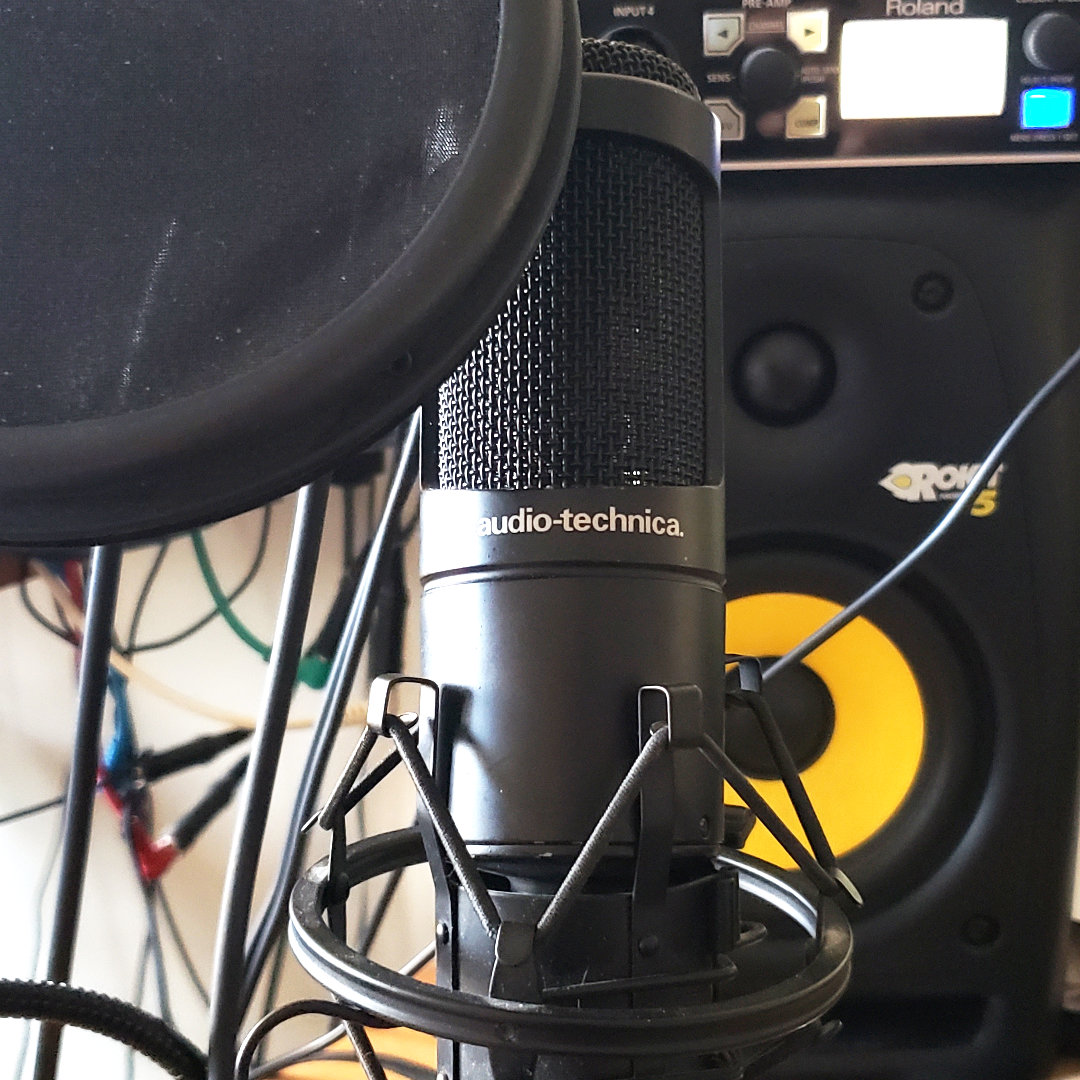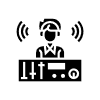
Recording Your Own Audiobook: A One Year Journey
Estimated Reading Time:
Recording your own audiobook is filled with highs and lows – kind of like the writing process. This post we’ll chat about the pos and cons of taking that journey. Audiobooks were gradually growing in popularity over the years, and then, the audience grew a lot. There has been an increase in subscription plans seen through Audible, Kobo, and Scribd, giving listeners various choices. From the creation standpoint, more platforms and services are available for authors to connect with narrators and audio engineers, making deals easy to obtain and sign off on. This all leads to more books transcending into the audio spectrum and into new listeners’ ears.
It is all quite exciting. As a writer, you can reach new audiences. Some readers may prefer to never touch audiobooks, and others swear by them. Some listeners enjoy the fact that they can perform multiple tasks while listening. Some also like both. The book’s subject or story will determine if they will listen to it or if they will read it.
What If You Are Interested in Recording Your Own Audiobook?
Yes, that is what we are here to discuss. Deals with narrators is a widespread way of approaching the audio realm, and for a good reason. These people are professionals, and they understand how to best execute their voice. You may even split it a third way with an audio engineer to make the sound quality superb. All of that is dandy. But we’re here to chat about the interest in recording your own audiobook and what I gathered from a year of recording them.
What We’ll Look at In This Post

Deciding to record your own audiobook is a daunting task. First, there’s writing the story. This is a big objective, and congratulations to you if you’re at this stage. Following the writing, you must have a home studio set up to record your book. Or you need access to professional equipment by other means.
Having the equipment is one thing, then you must master how to use them. Oh, let’s not forget the narration itself. This must be as engaging as the first word in your book. Just like writing, narrating has to capture the audience’s attention right away, or you’ll lose them. Some listeners will put an audiobook down because they can’t stand the voice.
These are a lot of skills to ask from someone whose job is to tell good stories. With all aspects of the writing industry in the modern world, writers wear many, MANY hats. This isn’t to discourage you, as you’ve probably already learned new skills from having a book published.
So, for this blog post, I’ll share my own personal experience recording audiobooks over the past year. We’ll look at the pros and cons from a high-level perspective. You can find plenty of articles online covering the nitty-gritty details of technical requirements and software. Narration performance is another topic entirely, but we’ll note it.
Why One Year?
Before we jump into the pros and cons of recording an audiobook, let me explain a bit of my background and why I chose one year to record audiobooks.
My Background

As an author, for years, people have asked if I had my works in audio format. Due to the lack of time, I did not, and my efforts were better spent writing a new book. In 2020, I started exploring audiobooks and offered the stories in a new medium for people to enjoy.
Starting in October 2020, I have recorded five audiobooks. Seed Me, Into the Macrocosm, Fire, Pain, & Ruin, Cultivate: Seed Me Relapse Edition, and Rave. Each of them took an astronomical amount of time to complete, from initial recording to publication. Of course, each audiobook got easier as I became more confident as a narrator and more knowledgeable in the production phase.
Thankfully, because this was during covid, we had a lot of time to spare due to lockdowns, social isolation, and nasty Alberta winters. So, it was the perfect storm to finally stop making excuses and try recording audiobooks.
To my advantage, I have done plenty of live readings over the years and previously posted YouTube videos of me reading short stories. I am also a music hobbyist, which gives me some basic understanding of acoustics and sound recording. The musical components have also slithered their way into the scores found within the audiobooks.
The software I used isn’t a standard. However, I have the software, and I made use of it. It’s intentionally designed for soft synth electronic music, but I used it purely for recording my musical equipment and audiobooks. All in all, I wanted to record audiobooks without investing a dime into anything new other than my time.
After releasing them consistently, it helped give me a sense if I wanted to continue recording them or take a break. These pros and cons are things I considered and notes that will come in handy to you.
Pros of Recording Your Own Audiobook
To start, let’s look at the positive aspects of recording your own audiobook and why it might be something that you should consider.
New Audiences

Audiobooks take a long time from beginning to end, and they require the same level of commitment as writing and finishing a book. Gradual and consistent progress every day will eventually take you to the end of the project. If you’ve written books before, audiobooks are no different. Of course, there’s the learning curve that comes with them.
The perk of recording audiobooks is you give your audience another method of discovering your story. They can hear your voice, as the author, deliver the story directly. You can also tap into the new and growing avenue of audiobook listeners who may never pick up and read one of your books.
Royalties and Project Management

If you record your own audiobook, you keep all of the royalties. In addition, you avoid any contract details or potentially paying narrators upfront. It’s all yours, you own the rights, and nothing else gets in the way.
Then there’s the project management of other people. Many writers don’t mind it, but if it’s not your jam, recording your own puts it all on your plate, and you can do it at your own pace.
Narrative Performance

Narration is an exciting part of the recording. You get to emphasize the words, characters, and scenes that happen throughout the story. This gives you a fantastic opportunity to bring the world to life through your own voice, the creator of the story. You can express fear, excitement, anger, and suspense all through pacing and tone.
You have already mastered the craft of the written word and have painted beautiful prose. Now you can take those words one step further and subdue them into people’s ear canals where they can absorb the passion of your storytelling. It can be a fascinating aspect of recording audiobooks. Then again . . .
Cons of Recording Your Own Audiobook
. . . recording your own voice can be pretty frightful if you’re not confident. Let’s talk about the negative aspects of recording your own audiobook. Even though there are plenty of good things, there’s a dark side to it.
Time

Audiobooks still take time to record. If you are recording them yourself, you are looking at spending many hours, many weeks, and months recording one book. This amount of time starts to sound very familiar to writing the first draft of a brand-new novel for your existing and potentially new readers.
An extensive critical piece of advice I wish I had read before I started this recording journey was, “audiobooks are worth recording if the book has consistent sales.” Don’t ask me where I read this from, for I can’t remember. However, it is an excellent piece of advice. There’s some books I probably would have skipped if I knew or thought this through. There’s some I would have recorded instead too.
If you have a book that is selling well and consistently, it means the audiobook will reach more people. It’s those clever Amazon AI algorithms doing their job. If your book isn’t selling well, the audiobook will likely be dead in the water.
Budget

Here’s a brief one: money. Notice I mentioned “not spending a dime” in my reasoning? Buying the software and equipment can cost if you want to record high-quality audio.
Learning Curve

As mentioned in the pros, there are a lot of moving parts in it. If you don’t understand audio recording or acoustics, you’re going to have a steep learning curve. There are a lot of technical requirements under the submission standards from each of the platforms.
Regarding acoustics, you don’t want noise where you are recording. It can be tough to find a quiet room and dampen the environment to have a crystal-clear audio signal without any distractions. That car that drove by, or that pet that made a noise? Well, now you got to re-record that sentence.
Exporting your files and making sure they reach the technical requirements is a whole other ballgame. You can spend a long time tweaking your files, submitting them, getting them rejected, tweaking again, and submitting until you finally understand sound mixing.
Narrative Performance

In contrast to the subsection under pros, we are going to talk about narrative performance again. A lot of people are not comfortable hearing their own voice in everyday situations. Then you add the component of entertainment on top of that! Narrations take skill, which is why there are professionals who do it full-time. Recording yourself can be daunting, especially if you don’t have anyone to coach you to improve your voice.
It can be intimidating to record yourself and sometimes feel outright ridiculous, emphasizing words in ways that you may never have done before. You may not be comfortable with it, and it might be a dealbreaker for you. You may even take personal offence reading criticism of your own voice from reviewers and listeners. The performance may even cause listeners to give your audiobook a bad review, so be wary of recording your own books. Get friends and colleagues to listen before you submit the book.
Conclusion
Ultimately, it is up to you to decide if you want to record your own audiobook. If you have some technical background and are comfortable with performance, you’re off to a fantastic start. Otherwise, it may be a steep incline. The pros and cons listed here are not to tell you what to do, and they are to help you weigh the options.
In short, decide if you have the time and effort to commit to such a heavy task. Perhaps you are better off hiring a professional narrator and sound engineer to record the audiobook, and you don’t mind the project management.
Here’s a third option, maybe none of this is worth your time at all, and you are better off writing the next book for existing readers and drumming up new ones. In the end, we’re writers, and there is a large pool of readers out there in the global market.
Have anything else to add about recording your own audiobook? Share in the comments, and we can discuss the good, the bad, and the ugly with recording audiobooks.

About Konn Lavery
Konn Lavery is a Canadian author whose work has been recognized by Edmonton’s top five bestseller charts and by reviewers such as Readers’ Favorite, and Literary Titan.

